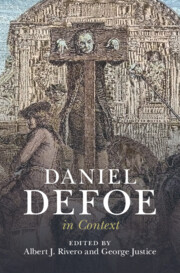Book contents
- Daniel Defoe in Context
- Daniel Defoe in Context
- Copyright page
- Contents
- Illustrations
- Notes on Contributors
- Preface
- Acknowledgements
- Chronology
- Part I Life and Works
- Part II Literary Context
- Part III Authorship and Copyright
- Part IV The Monarchy and Parliament
- Part V Social Structures and Social Life
- Chapter 23 The Penal System
- Chapter 24 Defoe and Religion
- Chapter 25 Social Status and Social Mobility
- Chapter 26 Education and Opportunity
- Chapter 27 Men and Women
- Chapter 28 Defoe and China
- Chapter 29 London, 1660–1731
- Chapter 30 The Environment
- Chapter 31 Marriage Law
- Chapter 32 Daniel Defoe and the Law of the Sea
- Chapter 33 Disability
- Chapter 34 Defoe and Colonialism
- Chapter 35 Defoe and Animals
- Chapter 36 Defoe and Slavery
- Chapter 37 Economics
- Chapter 38 Defoe and the Supernatural
- Chapter 39 Defoe and America
- Part VI Critical Fortunes and Literary Afterlife
- Further Reading
- Index
Chapter 25 - Social Status and Social Mobility
from Part V - Social Structures and Social Life
Published online by Cambridge University Press: 27 April 2023
- Daniel Defoe in Context
- Daniel Defoe in Context
- Copyright page
- Contents
- Illustrations
- Notes on Contributors
- Preface
- Acknowledgements
- Chronology
- Part I Life and Works
- Part II Literary Context
- Part III Authorship and Copyright
- Part IV The Monarchy and Parliament
- Part V Social Structures and Social Life
- Chapter 23 The Penal System
- Chapter 24 Defoe and Religion
- Chapter 25 Social Status and Social Mobility
- Chapter 26 Education and Opportunity
- Chapter 27 Men and Women
- Chapter 28 Defoe and China
- Chapter 29 London, 1660–1731
- Chapter 30 The Environment
- Chapter 31 Marriage Law
- Chapter 32 Daniel Defoe and the Law of the Sea
- Chapter 33 Disability
- Chapter 34 Defoe and Colonialism
- Chapter 35 Defoe and Animals
- Chapter 36 Defoe and Slavery
- Chapter 37 Economics
- Chapter 38 Defoe and the Supernatural
- Chapter 39 Defoe and America
- Part VI Critical Fortunes and Literary Afterlife
- Further Reading
- Index
Summary
This chapter explores the possibilities for and limitations upon social mobility as Defoe conceived them. His own biography exemplified the roller-coaster trajectory of the first-phase professional writer. In his non-fictional prose, he showed that commoners without pedigree, land, or title could aspire to the highest social echelons. His fiction, though, was energized by the opposite trajectory: downward mobility. His protagonists live on the paper-thin line between respectability and criminality, terrified of falling off the edge. The conflict between an absolute system of morality as prescribed in the Ten Commandments and the relative morality by which people in the world must live is one experienced repeatedly by Moll Flanders and other Defovian characters. Understanding the pragmatic ethical codes to which such characters must resort does not, though, entirely explain their fictional fates. Narrative energy is produced by the gap between the explicable and the mysterious in his characters’ motivations and actions.
- Type
- Chapter
- Information
- Daniel Defoe in Context , pp. 212 - 219Publisher: Cambridge University PressPrint publication year: 2023

